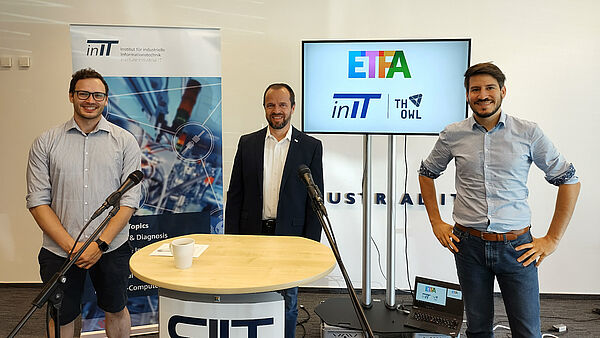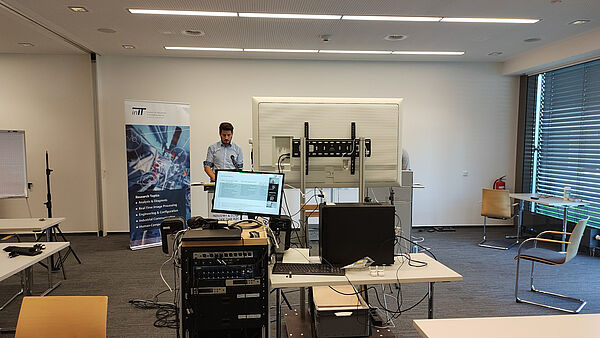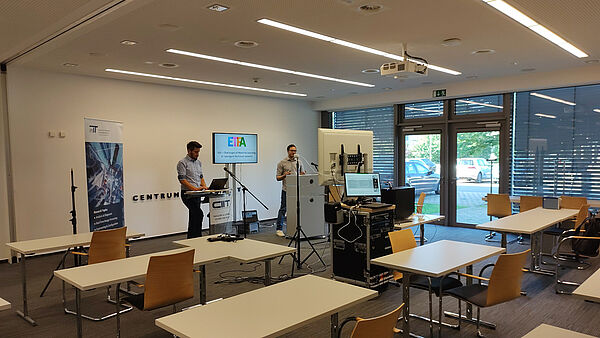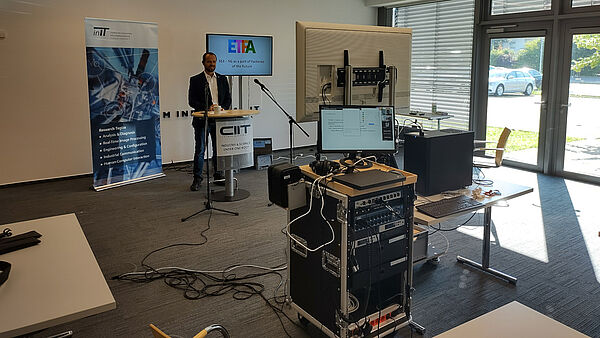Almost 400 registered participants attended this year's ETFA, the "IEEE International Conference on Emerging Technologies and Factory Automation" from September 7 to 10. The conference was held for the 26th time and is one of the world's most important conferences for new technologies in the context of factory automation. Last year it was held as a hybrid event, this year those responsible opted for a purely digital version. The central organization was in Västeras, Sweden.
One of the organizers was inIT board member Dr. Lukasz Wisniewski, who has been responsible for the Working in Progress Papers program at ETFA since 2016. In addition, inIT was again represented as usual with two special sessions.
The two research assistants Christoph-Alexander Holst and Anton Pfeifer organized the Special Session "Challenges of Machine Learning in Intelligent Technical Systems" together with their colleagues Prof. Dr. Diana Göhringer from TU Dresden and Prof. Dr. Alexander Maier from FH Bielefeld.
To date, machine learning represents the most advanced subfield of artificial intelligence. In this session, the experts focused on making machine learning (ML) fit for the special requirements of technical and industrial applications. It is not enough for ML to excel in Internet applications or on pure research data. Rather, ML algorithms must also be able to withstand the adversities and highest requirements in industry.
The presentations focused in particular on the interpretability of ML models and the prediction of machine behavior, as well as on new kinds of technical neurons that promise to further increase the performance of neural networks. The methods are applied or evaluated in drones, aircraft turbines, electric motors and assistance systems.
"ETFA ran in five parallel tracks simultaneously this year. We were particularly pleased that we were able to prevail over the parallel running competitor sessions in terms of visitor numbers. This shows that with our focus on industrial machine learning, we exactly meet the interests of the participants, both scientifically and economically," Holst is very satisfied afterwards. Nevertheless, he also looks back on the days. "I must honestly say that I miss the in-person conferences very much. Although the structure of ETFA has been kept and wonderfully transferred to the digital world, the personal contact is still missing," says Holst.
His colleague Arne Neumann agrees. "Without the in-person visit, it's harder to resist the day-to-day business and follow the relevant topics appropriately. The intensity of scientific exchange and face-to-face encounters are simply missing," he says.
Together with his inIT colleagues Lukas Martenvormfelde and Dr. Lukasz Wisniewski as well as Prof. Jürgen Jasperneite and Dr. Sebastian Schriegel from Fraunhofer IOSB-INA and Prof. Mikael Gidlund from Mid Sweden University, Neumann organized the special session "5G as a part of Factories oft the Future".
With their high reliability and low transmission times at high data rates, 5G networks offer properties that are needed for communication in increasingly flexible and mobile production environments. Deployment in this industrial environment places specific requirements on 5G. It is necessary to handle the increasing complexity of industrial networks due to 5G. This results in a broad field of research that should be addressed by the organization of this session.
Many high-quality contributions were submitted for the session, of which the four best contributions were presented. Their topics ranged from architecture comparisons and performance analyses to the radio-compliant implementation of machine safety measures and measurement results from pilot applications.
The session was attended by a balanced number of representatives from research and from companies, which shows that "5G as a part of Factories of the Future" is not only an exciting field of research, but also economically interesting.
After all, even in its new form, ETFA 2021 has remained a popular venue for research in the industrial and automation sector. The hope for an in-person event next year is still high among all participants.





